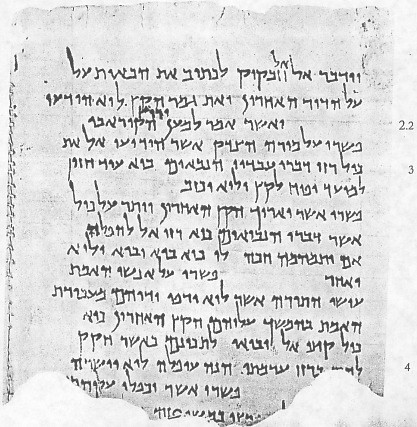The Pesher to HabakkukPage 7
Chapter 2:2 to 2:4

The last portion of verse 2 is repeated as part of the pesher on verse 2. Find it in line 3. Beginning after the words "ve 'asher 'amar" (and then he says) the last 4 words of the verse are written, The word "yarutz" (actually a jussive) is written above the line probably by the original scribe who omitted it and then edited his own text. For the comments on the first part of the verse and comments on "jussive" see the last note on the preceding page.
And YHWH answered me and said: Write the vision on tablets and make it clear so that the one running may read it.
We have not usually commented on the Peshers but look on line 1 and see the name Habakkuk as the 3rd word. The word " 'el" has been edited in as the editor took the first of the two same words to mean "God" and the 2nd to be prep. "to." At the end of the line and the first in the next a double use of "'al" is found. This is a mistake of reduplication.
This long verse of 17 words is divided into two parts by a pesher, But it is complete and matches M word for word. The verse begins as the 3rd from last word in line 5 (kiy')and continues to the end of the next line. The only differences are the addition of aleph to cj. "kiy" (an Aramaic accent) and the addition of semi vowel "waw" to negative "lo' " next to last word in line 6.
The rest of the verse is completed after the pesher and begins as the first word in line 9 and is completed in the first word in line 10 followed by a spatium and peshru. The last nine words of the verse match the M text word for word except for the usual spelling variations. There is the addition of aleph in the cj. "kiy" (5th word) and the addition of waw as a semi-vowel in each of the last 3 words in the same line. There is an addition of a waw cj. to the last word in this line meaning "and not." To see the difficulty in distinguishing some letters from others in the Pesher notice the 3rd word in this line (line 9) which is heth kaph he ("chakah") identified as a 3rd stem imperative meaning wait. Notice that the kaph is hardly distinguishable from a beth. Compare this with the kaph in the 2nd word following (kiy' ") and it with the beth in the next two words.("bo' ").
Because the vision is for its proper time and it will break out at the end and will not fail; though it is delayed, wait for it, because it will surely come and not be deferred.
Only the first 4 words of the nine that make up this verse survive. They are the last 4 words in the 3rd from last line. The words "naphsho bo" (his soul in him) were no doubt written in the lacuna at the beginning of the next to last line. And the rest of the verse is probably lost in the lacuna at the bottom of the page after the pesher. The next page begins with the word peshru and is a comment on the portion of the verse that is lost which is quoted in the N.T. "and the righteous shall live by his faith." Interestingly the Pesher ascribes personhood to the "Righteous" speaking of those "who place their faith in the "Righteous Teacher." So the Pesher understood this portion of the verse that is lost to mean "and the Righteous One shall live by his faith." An allusion to the Messiah.
Behold his soul is swelled up within him and twisted; but the righteous shall live by his faith.
For the translation of this page click here.